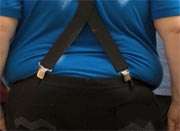Resveratrol appears not to have a metabolic effect in obese men, according to a study published in the April issue of Diabetes.
(HealthDay)—Resveratrol appears not to have a metabolic effect in obese men, according to a study published in the April issue of Diabetes.
Noting that animal and in vitro studies have indicated that resveratrol has an effect on obesity, diabetes, hypertension, and hyperlipidemia, Morten M. Poulsen, M.D., from Aarhus University Hospital in Denmark, and colleagues examined the metabolic effects of high-dose resveratrol in 24 obese, but otherwise healthy, men. Participants were randomized to four weeks of resveratrol or placebo.
The researchers found that there was a non-significant decrease in insulin sensitivity in both groups. No change was noted in endogenous glucose production or in the turnover and oxidation rates of glucose. No impact was noted for resveratrol supplementation on blood pressure, resting energy expenditure, lipid oxidation rates, ectopic or visceral fat content, or inflammatory and metabolic biomarkers.
"The lack of effect disagrees with persuasive data obtained from rodent models and raises doubt about the justification of resveratrol as a human nutritional supplement in metabolic disorders," the authors write.
The study was partially funded by the Novo Nordisk Foundation.
More information:
Abstract
Full Text (subscription or payment may be required)
Editorial
Journal information: Diabetes
Health News Copyright © 2013 HealthDay. All rights reserved.





















